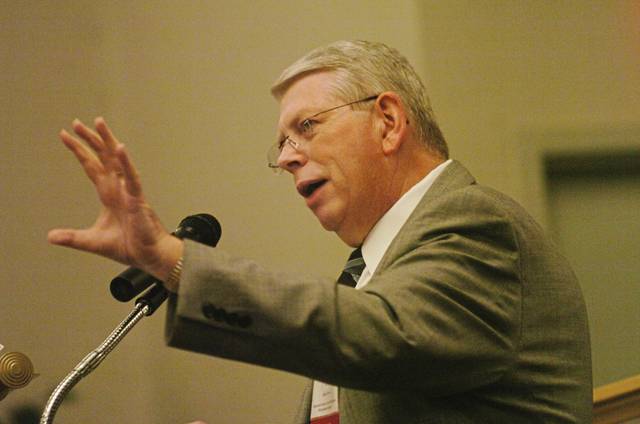Glenn Cannon, who helped found and build much of Pittsburgh’s public safety system — and then went on to serve at the state and national level — died Monday at the age of 71.
Cannon, who was Pittsburgh’s public safety director from 1986 to 1992, never forgot the men and women at heart of his profession. At the 2015 Red Cross Heroes Breakfast, he accepted the Community Leadership Award “on behalf of the …. men and women in our country who put themselves in harm’s way — the people in uniform, people not in uniform who go out and do what they do to save lives and end suffering.”
Cannon’s leadership in emergency management and public safety began in 1975, when Mayor Pete Flaherty named him to oversee a citywide mobile intensive care/advanced life support ambulance system. That system would later become the Emergency Medical Services Department.
“Back in ‘75, that was new stuff in the city. Before that, Pittsburgh and a lot of cities had police take people to the hospital. But Glenn’s vision was this new service and advance life support and he was able to convince Mayor (Peter) Flaherty it was the right thing to do,” said Robert Full, one of the city’s original 40 paramedics and later Allegheny County’s emergency services chief.
Under the new department, Cannon established Pittsburgh’s first River Rescue Unit, first Specialized Rescue Units and the city’s first Hazardous Materials Response Team. He led the department until 1986.
Cannon became public safety director in 1986, managing nearly 2,700 employees in police, fire, EMS, building inspection and administration and 911. During this time, he was also Pittsburgh’s emergency response coordinator. Wendell Hissrich, Pittsburgh’s present public safety director, remembers working under him as a medic.
“I saw firsthand how he was able to gain control of chaotic situations and ensure that first responders were able to do their jobs effectively,” Hissrich said in a statement, recalling Cannon’s leadership at a train derailment in 1987 in Bloomfield and the Ashland oil spill in 1988.
Jan Gammiere Marks, a former Pittsburgh paramedic whom Cannon hired in 1979, said he put considerable energy into expanding Pittsburgh’s emergency services, acquiring new trucks and ambulances every year.
“Our department grew by leaps and bounds,” she said. “Public safety was his life. He put 150% into doing what was best for the residents of the city.”
Marks said Cannon was also “incredibly progressive,” hiring her at a time when she said there were fewer than a dozen female paramedics in Pittsburgh.
Monroeville Police Chief Doug Cole was a teenager and junior firefighter in the 1970s when Cannon was a volunteer at the Monroeville Volunteer Fire Company #4.
“He was one of the leaders, from a public safety standpoint, certainly for the city of Pittsburgh, but really for the whole area,” Cole said.
Cannon also served as Allegheny County’s first county manager. He was responsible for all day-to-day operations, and he directed the development of the countywide 911 system.
Allegheny County Executive Rich Fitzgerald offered his condolences on Twitter. “He always looked out for our county and helped us when we needed it,” wrote Fitzgerald.
Cannon went on to work as an an administrator of the Federal Emergency Management Agency. As director of the Response Division, he was tasked with restoring the agency’s image after Hurricane Katrina. Then in 2011, Cannon was named as director of the Pennsylvania Emergency Management Agency by then-Gov. Tom Corbett. There, he handled emergency services and homeland security for the entire state.
“He always said our job is to save people’s lives and minimize their suffering and to protect property and the environment as much as possible,”Full said. “His motto at PEMA was: Hope is not a plan; failure is not an option.”
Freelance writer Michael Hasch contributed to this report. Teghan Simonton is a Tribune-Review staff writer. You can contact Teghan at 724-226-4680, via email at tsimonton@tribweb.com or via Twitter @teghan_simonton.








